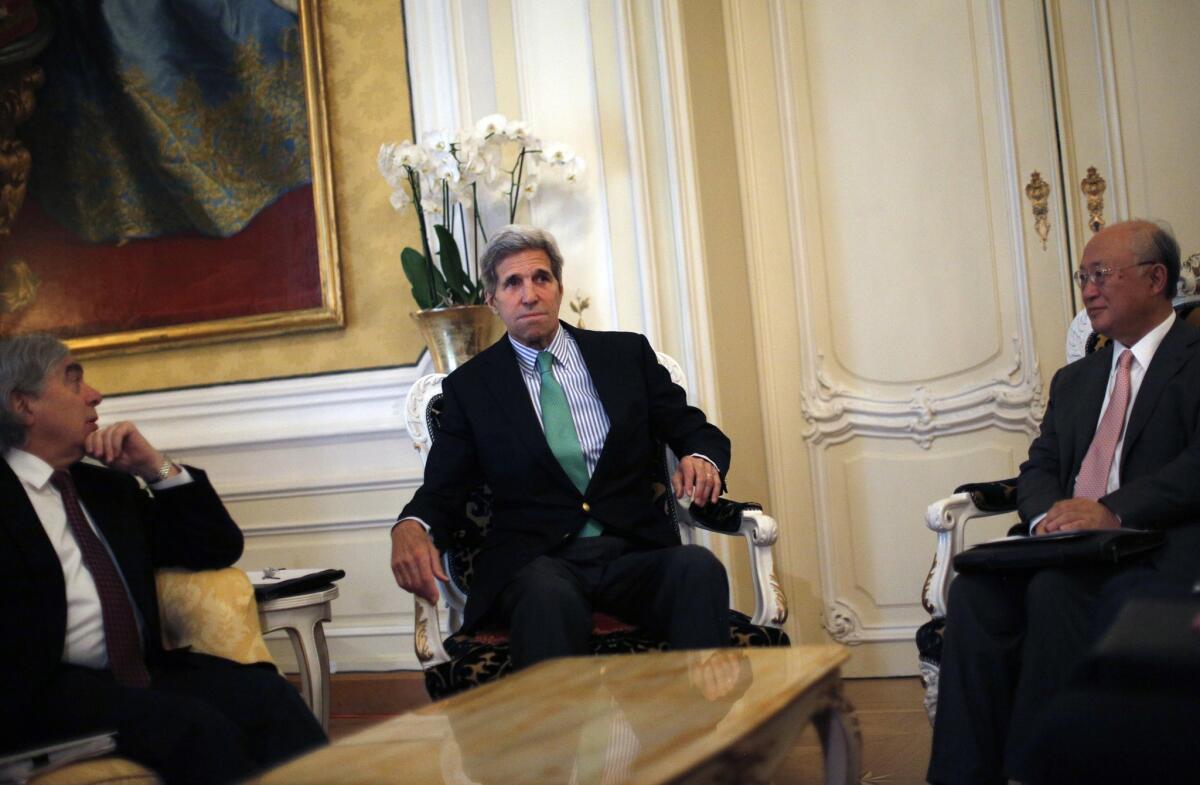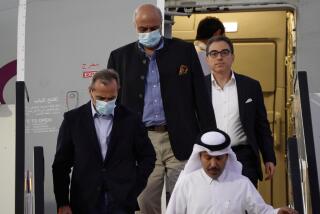U.S., Iran trade accusations of backtracking in nuclear talks

Secretary of State John F. Kerry, center, and Energy Secretary Ernest J. Moniz, left, hold talks with International Atomic Energy Agency Director-General Yukiya Amano in Vienna on Monday.
- Share via
Reporting from Vienna — As negotiators battle over the final terms of a nuclear agreement, Iran and six world powers have begun bickering over an important side issue: who gets the blame if the deal falls through.
In recent days, as diplomats have huddled in a porticoed 19th century palace in Vienna, the Austrian capital, Western officials have accused the Iranians of backtracking on commitments they made in a preliminary deal reached April 2 in Lausanne, Switzerland. Officials have pointed to comments by Iran’s supreme leader, Ayatollah Ali Khamenei, who last week appeared to lay down tough new terms that contradicted what U.S. officials say had been agreed to three months ago.
Iranian officials countered, saying U.S. officials also have been backtracking, but they seem increasingly worried that if the talks break down this week, the international community will hold their side primarily responsible.
The argument is about more than just national pride.
In addition to Iran and the U.S., representatives of Britain, France, Germany, Russia and China are pursuing a deal that would lift sanctions on Iran if its leaders accept limits on its nuclear program.
If Iran is held responsible for a breakdown of the 2-year-old talks, many countries would be far more willing to continue — or even intensify — economic sanctions that have badly battered Iran’s economy. Iran has been hoping that the United States would get blamed for intransigence and the world community would drop sanctions and start doing business again with the long-isolated Islamic Republic.
The Western focus on Iran’s perceived backsliding has been persistent. British Foreign Secretary Philip Hammond told reporters Sunday that there remained a number of areas “where we still have major differences of interpretation in detailing what was agreed in Lausanne.” On Monday, U.S. officials in Vienna and Washington told reporters that the Obama administration won’t accept a deal inconsistent with the agreement in Lausanne.
President Obama’s view is that if the Iranians refuse to accept an agreement based on the terms set in April, “then there won’t be an agreement,” said White House Press Secretary Josh Earnest.
Iranians have been fuming over these insinuations. The hard-line newspaper Kayhan on Monday said the Western media were unfairly accusing Iran’s supreme leader of trying to evade past commitments.
“They are playing the blame game,” the newspaper said.
Khamenei said last week that Iran would not allow international inspectors access to military bases to monitor the country’s nuclear activities and would not permit interviews of Iranian scientists.
But the Iranians say the United States is the one trying to change commitments it made in April. According to them, the Obama administration is trying to take back an agreement to allow Iran to keep 1,000 centrifuges in its bomb-resistant underground site at Fordow and to operate about one-third of those machines for nonnuclear research.
Nader Karimi Juni, an independent analyst in Iran, said in an interview that a reduction in the number of centrifuges at Fordow would be “absurd.... It would not be worthy at all.”
A senior administration official in Vienna denied the charge, saying U.S. officials were holding to the agreement on Fordow reached in April.
U.S. officials have been generally optimistic in recent weeks, with some pegging the chance of completing a deal at 60% or even higher. But the senior official was cautious, speaking on condition of anonymity because officials are not authorized to discuss the closed-door negotiations by name.
“We still do not know whether we will be able to get there,” the official said.
The pace of high-level talks, which has been intense, appeared to slow somewhat Monday as Iranian Foreign Minister Mohammad Javad Zarif returned to Tehran for consultations. Iranian and U.S. officials insisted that was not a sign of trouble.
Zarif is expected to return to the talks Tuesday with Ali Akbar Salehi, head of Iran’s nuclear organization, and Hossein Fereydoun, who is a brother and advisor to Iranian President Hassan Rouhani. Salehi has been under medical treatment in recent months, which has slowed some technical work in the negotiations, officials say.
U.S. officials disputed Iranian news reports that Obama sent a letter to top Iranian officials through Iraqi Prime Minister Haider Abadi.
Times staff writer Richter reported from Vienna and special correspondent Mostaghim from Tehran.
Twitter: @RichtPau
More to Read
Sign up for Essential California
The most important California stories and recommendations in your inbox every morning.
You may occasionally receive promotional content from the Los Angeles Times.











